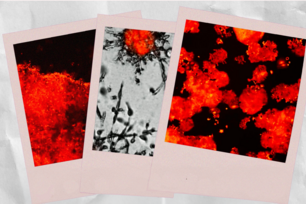Robert Weinberg To Receive National Medal of Science From President Clinton
On Tuesday, December 16, President Clinton will present the National Medal of Science, the nation's highest scientific honor, to Whitehead Member and cancer research pioneer Dr. Robert A. Weinberg and eight other recipients. Dr. Weinberg is a founding member of the Whitehead Institute for Biomedical Research, the Daniel K. Ludwig Professor for Cancer Research in the Department of Biology at the Massachusetts Institute of Technology (MIT), and an American Cancer Society Research Professor at MIT.
Dr. Weinberg, winner of the 1997 National Medal of Science, is one of the five original Members of the Whitehead Institute. He earned his Ph.D. in Biology from MIT in 1969 and joined the faculty in 1972, following post-doctoral fellowships in Israel and California. He was appointed a Professor at MIT in 1982, the same year he joined the Whitehead Institute. Dr. Weinberg was named American Cancer Society Research Professor in 1985 and received the Daniel K. Ludwig Professorship for Cancer Research in 1997. Dr. Weinberg's numerous honors include: Fellow of the American Academy of Arts and Sciences; Member of the U.S. National Academy of Sciences; Discover Magazine Scientist of the Year (1982), National Academy of Sciences/U.S. Steel Foundation Award in Molecular Biology, Bristol-Myers Award for Distinguished Achievement in Cancer Research, the Gairdner Foundation International Award, and the Max Delbrück Medal of the Max-Delbrück Center in Berlin.
Dr. Robert Weinberg's unique contribution to cancer research, the identification of genes that convert a normal cell into a cancerous cell, has changed the way we think about cancer. His initial work played a major role in convincing the medical community that cancer is a genetic disease. Dr. Weinberg isolated a cancer-causing gene, or "oncogene," from chemically transformed cells and, in a dramatic experiment, showed that introducing the oncogene into a normal cell could convert that cell into a cancer cell.
The remarkable consequences of Dr. Weinberg's work for the central concept of cancer research has to be understood in historical terms. Initially, the relationship between the viral genes implicated in cancer and the cellular oncogenes that Dr. Weinberg had uncovered was a mystery. Dr. Weinberg's finding that the oncogenes of the virus and those of the cell were close relatives solved the mystery, unifying the viral and cellular theory for cancer&emdash;the same aberrant gene, whether introduced by a virus or created by alteration of a normal cellular gene, can lead to malignancy. Dr. Weinberg's seminal finding has made a significant impact both on basic cancer research and on diagnosis of the disease.
Dr. Weinberg's laboratory continues to lead the way in cancer research in two major areas: tumor suppressor genes and human telomerase. Tumor suppressor genes play the crucial role of preventing normal cells from entering an abnormal growth pathway. Dr. Weinberg's isolation of the tumor suppressor gene for retinoblastoma (Rb, a cancer of the eye) reinforces the theory of a genetic basis for cancer. In a decisive set of experiments, his laboratory demonstrated the molecular basis for action of the retinoblastoma gene. The Rb protein is a critical cell cycle regulator, which is necessary to control cell division. Mutant forms of Rb fail to halt cell division, with the inevitable outcome that cells divide in an unregulated fashion&emdash;the hallmark of tumorigenesis.
Dr. Weinberg has recently isolated the human gene that encodes the key telomerase protein. Evidence from many laboratories indicates that telomerase, an enzyme required for the synthesis of the ends of chromosomes, is the meter by which a cell monitors its number of cell divisions. Many researchers have hypothesized, therefore, that telomerase is critical for the immortalization of malignantly transformed cells. In agreement with this idea, Dr. Weinberg's group has shown that telomerase activity is present in immortal transformed cells and absent in mortal normal cells. Dr. Weinberg's finding has exposed a prime target for inhibitors of telomerase with the hope that these may block tumor progression.
Dr. Weinberg has not only made exceptional contributions to cancer research but also has trained a generation of scientists dedicated to furthering this critical work. Although there have been many contributors to the genetic theory of cancer, Dr. Weinberg's pioneering work is cited as the most convincing evidence for the cellular basis of the disease.
Topics
Contact
Communications and Public Affairs
Phone: 617-452-4630
Email: newsroom@wi.mit.edu


